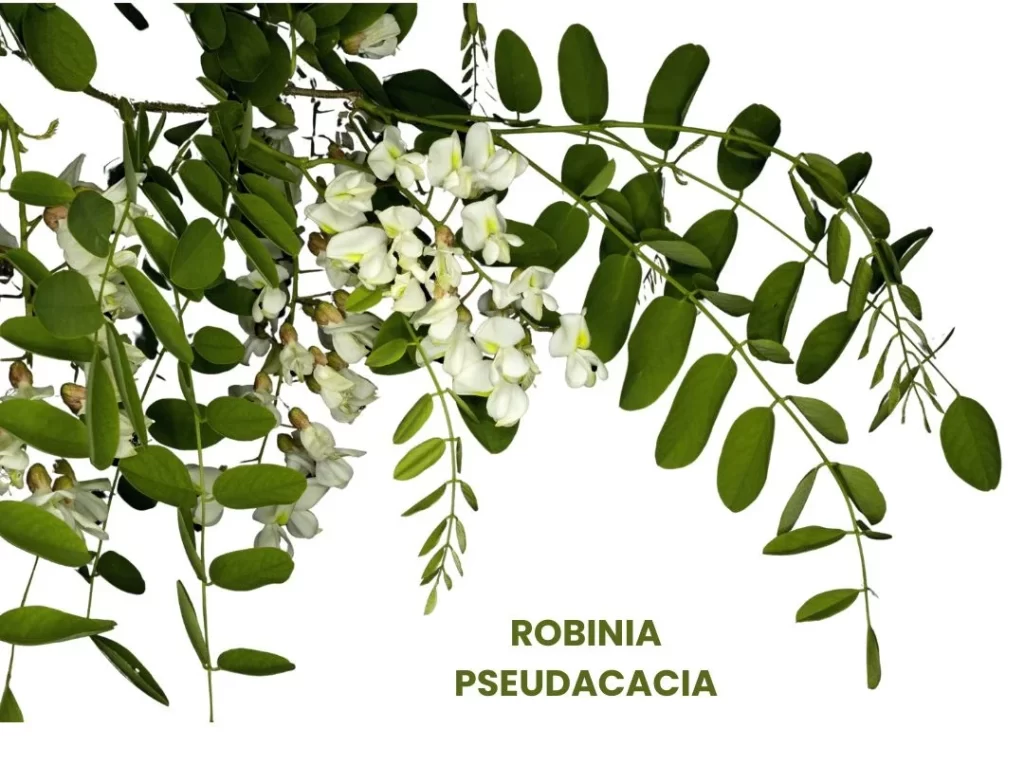Robinia Pseudacacia, commonly known as the Yellow Locust, is a homeopathic remedy primarily used to address issues related to excessive gastric acidity and rapid digestion of albuminoids with impaired starch digestion.
The remedy is notable for its efficacy in treating hyperchlorhydria and associated symptoms such as intense acidity, frontal headaches, and acrid eructations.

Table of Contents
ToggleSOURCE INFORMATION
Scientific Classification
- Kingdom: Plantae
- Clade: Angiosperms
- Clade: Eudicots
- Order: Fabales
- Family: Fabaceae
- Genus: Robinia
- Species: R. pseudacacia
Origin
- Robinia Pseudacacia is native to the southeastern United States but has become widely distributed across temperate regions of the world.
- The plant is known for its fast growth and is commonly used in landscaping and erosion control.
Historical Facts
- Robinia Pseudacacia has been utilized in traditional medicine for its medicinal properties, particularly for digestive disorders.
- The tree is also known for its durable wood and attractive white flowers, which are used in ornamental planting.
DRUG PATHOGENESIS
- Robinia Pseudacacia primarily affects the digestive system, particularly in conditions involving excessive stomach acid.
- It is indicated in cases of hyperchlorhydria (excessive hydrochloric acid in the stomach), which leads to sour and acrid gastric symptoms.
- The remedy also influences the nervous system, manifesting as frontal headaches and general discomfort.
KEY CHARACTERISTICS
- Hyperchlorhydria: Excessive stomach acid with symptoms of intense acidity.
- Sour Symptoms: Acrid eructations, sour vomiting, and sour stools.
- Digestive Issues: Rapid digestion of proteins (albuminoids) and impaired digestion of starches.
- Gastric Headache: Frontal headache associated with acid dyspepsia.
- Flatulence and Constipation: Abdominal distension with colic and constipation.
DETAILED ORGAN SYMPTOMS
HEAD
- Dull, throbbing frontal pain: Pain in the forehead area, worse with motion and reading.
- Gastric headache: Headache related to gastric disturbances, particularly with acid vomiting.
STOMACH
- Dull, heavy aching: General discomfort and pain in the stomach.
- Nausea: Feeling of queasiness and urge to vomit.
- Sour eructations: Burping up acrid, sour fluid.
- Profuse vomiting: Excessive vomiting of intensely sour fluid.
- Great distention: Significant bloating and fullness in the stomach and bowels.
- Flatulent colic: Severe cramping pain in the abdomen due to gas buildup.
- Sour stools: Stools with a sour odour, often seen in children.
FEMALE
- Nymphomania: Excessive sexual desire.
- Acrid leucorrhoea: Foul-smelling vaginal discharge.
- Discharge of blood between menstrual periods: Irregular bleeding outside of menstrual cycles.
- Herpes on vagina and vulva: Viral infection causing sores on the external genitalia.
MODALITIES
- Worse: Motion, reading, and certain foods that increase acidity.
- Better: Rest and avoiding acidic foods.
WHAT ARE MODALITIES IN HOMOEOPATHY?
RELATIONSHIP WITH OTHER DRUGS
COMPARE WITH
- Magnesia phosphorica: For similar gastric acidity issues.
- Argentum nitricum: For symptoms of gastric acidity and digestive disturbances.
- Orexine tannate: For related issues of hyperchlorhydria and deficient acid digestion.
ANTIDOTES: Camphor (for excessive symptoms); Sulphuric acid (for acute symptoms).
COMPLEMENTARY: Magnesia carbonica (for deficiency of gastric acid and related symptoms).
DOSE
- Potency: Typically used in the third potency.
- Treatment should be continued for a prolonged period to address chronic conditions.
Frequently Asked Questions (FAQs)
What conditions can Robinia Pseudacacia treat?
- It is effective for conditions associated with excessive stomach acidity, sour eructations, acrid vomiting, and gastric headaches.
- It is also used for digestive issues such as rapid digestion of proteins and impaired starch digestion.
How should Robinia Pseudacacia be administered?
- It is usually administered in the third potency.
- The remedy should be taken consistently over a long period to address chronic symptoms.
- Follow the dosage instructions provided by a homeopathic practitioner.
Can Robinia Pseudacacia be used for children?
- Yes, it can be used for children, particularly for treating sour digestive symptoms, but dosage should be adjusted according to the child’s age and condition.
What should be avoided while taking Robinia Pseudacacia?
- Avoid foods and drinks that increase stomach acidity and exacerbate symptoms. Rest and a balanced diet are recommended.
Glossary of Difficult Words
- Hyperchlorhydria: Excessive hydrochloric acid in the stomach.
- Acrid: Sharp, bitter, or irritating in taste or smell.
- Eructations: Burping or belching.
- Nymphomania: Excessive or uncontrollable sexual desire in women.
- Leucorrhoea: Abnormal white or yellowish discharge from the vagina.
- Herpes: A viral infection causing sores, particularly around the genital area.
This detailed drug picture of Robinia Pseudacacia offers a comprehensive view of its uses, symptoms, and administration, providing valuable information for both practitioners and patients.
